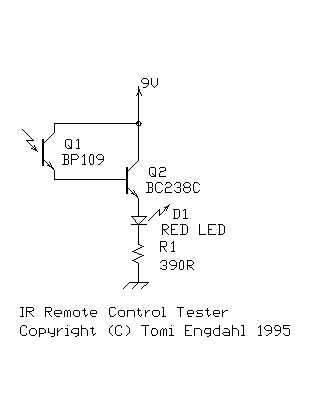This circuit is a simple IR detector for testing IR remote controllers. The circuit is based on one phototransistor which receives the IR beam. The NPN transistor works as an amplifier which feeds current to the led. When this circuit detects IR or light, the LED is on. So you need to shield the phototransistor from ambient light if you don't want to do your tests in the dark. The best way is to fit the phototransistor in a small black tube. I used 2 cm long piece of insulating tube and fitted the phototransistor into the middle of the tube.

I built my circuit from components found in junk box. The values are not critical and you can substitute the phototransistor with other type. I have tried some other types as well, and the circuit works well with them also.
The circuit is designed to be a simple circuit to test IR remote controllers. The detecting range is typicallty in range of 10 cm to 1 meter depending on the components used and the strength of the IR source you try to detect.
Q1 BP109 (or similar phototransitor) Q2 BC238C or BC547 D1 RED LED R1 390 ohms 0.25W
Almost any common NPN small signal transistor should work as Q2. If BC238 is not available BC547 or 2N2222 should work also. If you can not find original component model for Q1 you cna try almost any phototransistor for this (the circuit performance might vary but should work somehow with wide variety of phototransistors).
If you own a video camera you can use it directly for viewing the IR signal from the remote control. Just point the remote control to the video camera and you sould see some flickering light in the video screen/viewfinder. This works because the CCD elements in the modern video cameras are also sensitive to IR radiation also. This ideas works with most of the video cameras but might fail on some (because some older cameras did not use CCD element and some new video cameras can have very good IR filtering in them).
I one day received a mail telling that you can also use any AM radio to detech the signals the IR remote controller sends. I tested a small AM radio (tuned to 530..1800 KHz band) with half dozen IR remote controllers and this idea really works. When you put the IR remote controller near the radio and point your IR remote control at the ferrite antenna of an AM radio, you should hear bleeping sounds from the radio when you activate the remote control. The AM radio does not detect the actual IR beam, but it will detect the electrical noise the IR remote controller generates when it operates.
I think that nose noises are form high current pulses sent to the IR LED when it transmits or the RFI from the controller IC inside the IR remote controller. The reason why AM radio picks up those well might be that IR remote controllers used in consumer products typically uses 455KHz ceramic crystal resonator as part of frequency synthesis circuit. 455KHz happens to be IF for the AM receivers. Remote generates about 40Khz carrier modulated with typically around 400uS-800uS square wave. You should be able to hear this square wave as between 1-3 kHz audio tone on radio tuned at anywhere in the AM band.